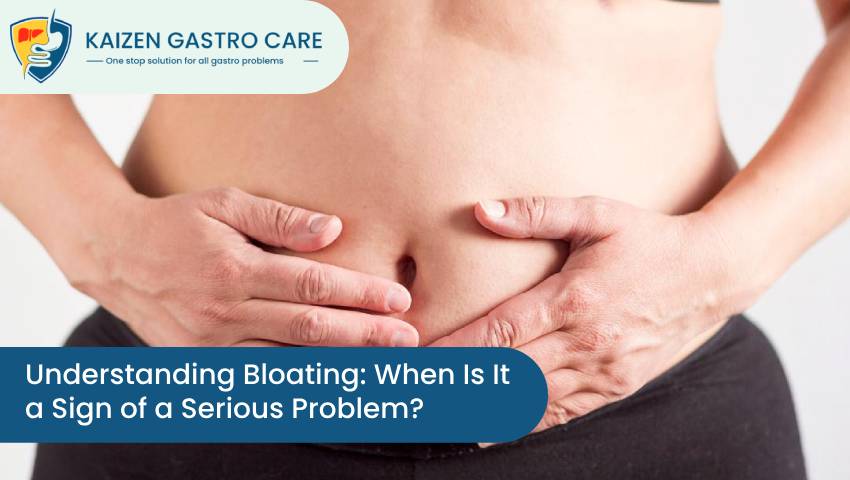
- 06/01/2025
- Kaizen Gastro Care
- 0 Comments
- Gut Health
Understanding Bloating: When Is It a Sign of a Serious Problem?
Bloating is a common and usually uncomfortable sensation that many people experience. It is characterized by a feeling of fullness, tightness, or swelling in the abdomen, often accompanied by excessive gas, burping, or abdominal pain. While bloating is usually harmless and temporary, it can sometimes indicate an underlying health problem. In this blog, Dr. Vikrant Kale, a renowned gastroenterologist in Pune, explains the causes of bloating, when to seek medical attention, and how to manage it effectively.
What is Bloating?
Bloating refers to a sense of fullness, tightness, or swelling in the abdomen. It may be accompanied by visible distention, discomfort, or even pain. Bloating can occur due to the buildup of gas in the digestive tract, changes in digestion, or fluid retention.
What Causes Bloating?
Bloating can result from several everyday factors, including:
- Dietary Habits: Overeating, consuming gas-producing foods like beans and broccoli, or drinking carbonated beverages can lead to bloating.
- Overeating: Ingesting large meals can stretch the stomach, leading to discomfort.
- Swallowed Air: Eating or drinking too quickly can cause you to swallow air, contributing to bloating.
- Food Intolerances: Conditions like lactose intolerance or gluten sensitivity can trigger bloating after ingesting certain foods.
- Hormonal Changes: Many women experience bloating during their menstrual cycle due to hormonal changes.
- Constipation: Difficulty passing stools can trap gas in the intestines, causing bloating.
While these causes are generally harmless, ongoing or severe bloating could point to a more serious problem.
Serious Conditions Linked to Bloating:
- Irritable Bowel Syndrome (IBS): A common disorder that affects the large intestine, leading to bloating, abdominal pain, and altered bowel habits.
- Celiac Disease: An autoimmune condition triggered by gluten, causing bloating, diarrhea, and malabsorption of nutrients.
- Small Intestinal Bacterial Overgrowth (SIBO): An overgrowth of bacteria in the small intestine that can lead to bloating and digestive discomfort.
- Ovarian Cancer: In women, persistent bloating can be an early symptom of ovarian cancer and should not be ignored.
- Ascites: The accumulation of fluid in the abdomen, often associated with liver disease or cancer.
- Gastroparesis: A condition where the stomach empties slowly, causing bloating and fullness.
When is Bloating a Sign of a Serious Problem?
Although bloating is often harmless, certain signs alongside bloating might indicate a more severe problem. Pay attention if you experience:
- Persistent or Chronic Bloating: Bloating that doesn’t resolve or occurs frequently could point to conditions like irritable bowel syndrome (IBS) or small intestinal bacterial overgrowth (SIBO).
- Severe Pain or Discomfort: Intense abdominal pain with bloating might signal gastrointestinal blockages, ulcers, or other severe conditions.
- Unintended Weight Loss: Sudden, unexplained weight loss along with bloating could be linked to gastrointestinal cancers or malabsorption problems.
- Changes in Bowel Habits: If bloating is accompanied by diarrhea, constipation, or blood in the stool, it may indicate inflammatory bowel disease (IBD) or colon cancer.
- Other Warning Signs: Fever, persistent nausea, or vomiting with bloating could indicate infections, liver disease, or other serious conditions.
- Difficulty Swallowing or Feeling Full Quickly: These symptoms, when paired with bloating, may indicate stomach or esophageal problems, such as gastroparesis or a tumor.
When to See a Doctor?
If you’re unsure whether your bloating is normal, it’s better to consult a doctor on the side of caution. The best bloating doctor in Pune, Dr. Vikrant Kale advises seeking medical attention if you experience:
- Persistent bloating for more than a week.
- Symptoms that interfere with daily activities.
- Additional concerning signs like weight loss, fever, or blood in the stool
How Dr. Vikrant Kale Can Help?
The best bloating treatment specialist in Pune, Dr. Vikrant Kale, and his expert team specialize in diagnosing and treating various gastrointestinal conditions. Using advanced diagnostic tools and personalized treatment plans, they ensure the best care for their patients. Whether it’s a simple dietary adjustment or treatment for a complex condition, you can trust Dr. Vikrant Kale for comprehensive care.
Tips to Prevent Bloating:
- Eat Slowly: Chew food thoroughly to reduce air swallowing.
- Avoid Gas-Producing Foods: Limit intake of beans, onions, and carbonated drinks.
- Stay Active: Routine exercise can enhance digestion and prevent constipation.
- Hydrate: Drinking adequate water helps maintain healthy digestion.
- Probiotics: Include yogurt or supplements to support gut health.
- Monitor Triggers: Keep a food diary to identify and avoid bloating triggers.
Conclusion:
While occasional bloating is usually harmless, persistent or severe bloating accompanied by other signs should not be ignored. Understanding the potential causes and seeking timely medical attention can make a significant difference in addressing the problem effectively.
If you’re struggling with bloating and want expert advice, book an appointment with Dr. Vikrant Kale at Kaizen Gastro Care Clinic today. Your digestive health is our priority!
